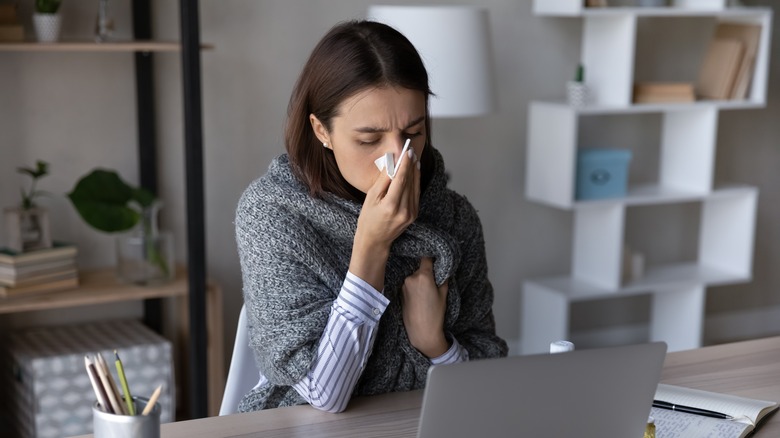Can Getting The Flu Shot Give You The Flu?
Some people are afraid to get their annual flu shot because they think the vaccine will end up giving them the flu. This myth is common but just that: a myth. Getting the flu shot cannot give you the flu. The viruses in the vaccine are either dead or weakened, so it is impossible for them to infect you (via Harvard Health Publishing). If you do end up getting the flu immediately after getting your vaccine, the virus had already infected you. It can also take up to two weeks to get full protection from the flu vaccine, so you are still susceptible to the virus during that time period after getting the flu shot.
It is possible to experience minor side effects from the vaccine, such as a sore arm or low-grade fever. These side effects are usually mild and go away within a few days. While some of these symptoms share similarities with the flu, they are not as serious as the virus itself. Symptoms of the flu include fever, chills, muscle aches, sore throat, vomiting, and fatigue (via the Centers for Disease Control and Prevention). Getting the flu shot is still the best way to protect yourself against the virus. The vaccine is especially important for people who are at high risk for complications from the flu, such as pregnant women, young children, people with chronic health conditions, and people 65 years of age and older.
Other myths about the flu shot
The flu vaccine is one of the most controversial topics in the medical community. Some people believe that the flu vaccine is a life-saving tool that can prevent serious illness, while others believe that the vaccine is ineffective and even dangerous. Although there are many myths about this vaccine, the truth is that it is a safe and effective way to prevent yourself from getting really sick.
Another common misconception about the flu shot is that it is only effective for a few weeks. This myth is also false. While the vaccine's effectiveness can vary from year to year, it typically provides protection for several months, which should protect you through flu season if you time your shot correctly (via Science). Additionally, even if the vaccine doesn't prevent you from getting the flu completely, it can still reduce the severity of your symptoms and make you less likely to require hospitalization.
Some people also believe that the flu shot is dangerous. While there is always a risk of minor side effects when receiving any vaccine, the benefits of vaccination far outweigh the risks for the majority of people. According to the World Health Organization, serious complications from the flu shot are extremely rare, and millions of people safely receive the vaccine every year. If you are concerned about side effects from the flu vaccine, talk to your doctor about your worries and personal risk.
Is the flu really that dangerous?
The flu is a serious respiratory illness that can lead to hospitalization and even death. Each year, thousands of people in the United States die from the flu (via the CDC). The best way to protect yourself from the flu is to get vaccinated each year. The flu virus is spread through droplets of saliva or mucus from an infected person when they cough or sneeze. It can also be spread through contact with contaminated surfaces, such as door handles or doorknobs.
Symptoms of the flu include fever, headache, fatigue, muscle aches, sore throat, and coughing (via Cleveland Clinic). The symptoms usually last for one to two weeks. Some people, however, may experience severe illness, such as pneumonia or bronchitis, and may require hospitalization. People at high risk for developing complications from the flu include young children, pregnant women, people with chronic medical conditions, and people 65 years of age and older. These groups of people should get vaccinated each year even if they do not have symptoms of the flu.
If you do get sick with the flu, there are some things you can do to help lessen your symptoms and speed up your recovery. These include getting plenty of rest, drinking fluids, and taking over-the-counter medications to relieve fever and muscle aches. If you are experiencing serious symptoms from the flu or you have a high risk of experiencing complications, seek medical attention if you think you have the virus.



